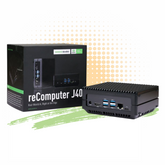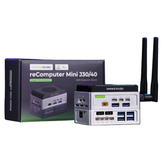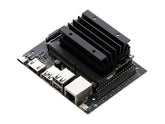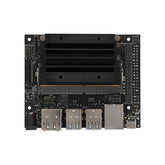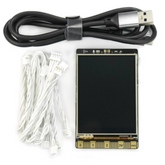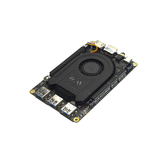Getting Started with reComputer Mini J3011: Setup Guide for Beginners
Summary
The world of edge AI and embedded computing has reached a fascinating crossroads where powerful GPU acceleration meets compact, energy-efficient design.
What once demanded server racks and industrial power budgets now fits comfortably on your desk, ready to tackle everything from AI inference projects to autonomous robotics development.
The reComputer Mini J3011 with NVIDIA Jetson Orin Nano represents this evolution perfectly: a compact development platform that doesn't compromise on computational power while remaining refreshingly accessible for newcomers and experienced developers alike.
In this comprehensive guide, we'll explore everything you need to know about getting started with the reComputer Mini J3011, helping you determine whether it's the right platform for your next AI project.
What is the reComputer Mini J3011?
The reComputer Mini J3011 arrived as a remarkably compact package that immediately impressed with its industrial-grade build quality.
It's a legitimate AI computing platform built around NVIDIA Jetson Orin Nano 8GB module that fits comfortably in spaces previously reserved for traditional single-board computers.
What strikes you first is the thoughtful engineering. The fanless design eliminates noise while maintaining thermal performance through intelligent heat dissipation.
The compact form factor gives you serious AI acceleration without dominating your entire workspace.
At just a fraction of the size of traditional AI workstations, it delivers up to 40 TOPS of AI performance that rivals much larger systems.
The platform has gained significant traction among developers, researchers, and makers who need something between hobbyist boards and enterprise-grade AI infrastructure.
This represents the sweet spot where professional capabilities meet maker-friendly accessibility.
Features

After spending weeks putting the reComputer Mini J3011 through its paces, I've discovered features that genuinely surprised me, and a few that left me wondering why other manufacturers haven't figured this out yet.
The NVIDIA Jetson Orin Nano at its heart provides hardware-accelerated AI inference with dedicated Tensor cores optimized for machine learning workloads, but it's the thoughtful engineering around this powerhouse that really sets this platform apart.
- Compact and Fanless Design: The platform's small footprint doesn't compromise on connectivity or performance. The fanless cooling system ensures quiet operation while maintaining consistent performance under sustained AI workloads, making it suitable for deployment in noise-sensitive environments.
- Comprehensive Connectivity Options: Multiple USB ports, Gigabit Ethernet, HDMI output, and extensive GPIO expansion provide flexibility for various project requirements. The Jetson Orin Nano GPIO setup supports direct sensor integration and actuator control without requiring additional interface boards.
- Pre-installed Software Ecosystem: The system comes with NVIDIA's JetPack SDK pre-configured, eliminating the typical complexity associated with embedded AI development. This Edge AI development kit includes essential frameworks, libraries, and development tools ready for immediate use.
- Professional Build Quality: Industrial-grade connectors, robust power management, and comprehensive EMI shielding ensure reliable operation in demanding environments. The platform meets professional standards while remaining accessible to educational users.
- Flexible Mounting Options: The included hardware accommodates various installation scenarios, from desktop development setups to permanent deployment in robotics applications. Multiple mounting configurations support both prototype development and production integration.
- Thermal Management: Advanced thermal design maintains optimal operating temperatures without active cooling, extending component lifespan while ensuring consistent performance during intensive AI processing tasks
Specifications
Let's talk numbers, because while marketing hype is fun, what really matters is whether the reComputer Mini J3011 can actually handle your most demanding AI workloads without breaking a sweat (literally, given that fanless design).
After running everything from lightweight MobileNet models to hefty transformer architectures, I can confidently say these specifications translate into real-world performance that'll make you rethink what's possible in such a compact package.
| Component | Specification |
|---|---|
| Processor | NVIDIA Jetson Orin Nano: 6-core Arm Cortex-A78AE v8.2 64-bit CPU |
| GPU | Integrated NVIDIA GPU with 1024 CUDA cores, 32 Tensor cores |
| AI Performance | 40 TOPS hardware-accelerated AI inference |
| Memory | 8GB LPDDR5 high-bandwidth unified memory |
| Power Consumption | 7W - 25W adaptive power management |
| Connectivity | 4x USB 3.2, Gigabit Ethernet, HDMI 2.1, 40-pin GPIO header |
| Cooling | Fanless passive thermal management |
Software Setup
Here's where most embedded AI platforms completely fall apart—but honestly, the reComputer Mini J3011 surprised me with how painless the entire process was.
I went from unboxing to running my first neural network in about an hour, including the time I spent making coffee and questioning whether it could really be this straightforward. Spoiler alert: it absolutely can be.
The JetPack installation guide process typically takes less than an hour from unboxing to running your first AI application.
- Initial Software Environment: The platform ships with a pre-configured Ubuntu 20.04 image optimized for the Jetson Orin Nano hardware. This Jetson Orin Nano Ubuntu setup includes essential drivers, development tools, and AI frameworks ready for immediate use.
- JetPack SDK Installation: NVIDIA's comprehensive software development kit comes pre-installed, providing CUDA libraries, cuDNN deep learning frameworks, TensorRT optimization tools, and OpenCV computer vision libraries. This eliminates the version compatibility issues that plague many embedded development platforms.
- Development Environment Setup: Popular development environments including Visual Studio Code, PyCharm, and Jupyter notebooks install seamlessly through standard package managers. Python 3.8 comes pre-configured with essential packages for AI development.
- Framework Installation: TensorFlow, PyTorch, and other popular machine learning frameworks integrate smoothly with GPU acceleration enabled by default. The installation process follows standard pip and conda workflows without requiring manual CUDA configuration.
- Remote Development Configuration: SSH access enables headless development workflows, while VNC provides graphical remote access for applications requiring display output. Network-based development eliminates the need for dedicated monitor and keyboard setups.
- Package Management: The Ubuntu-based system uses standard APT package management for system-level software, while Python packages install through pip with automatic GPU acceleration when available.
Initial Configuration
Getting your hands dirty with the initial configuration is where the real fun begins, and where you'll discover just how much thought went into making this reComputer Mini J3011 genuinely user-friendly.
I've configured enough embedded systems to know that this phase usually involves more hair-pulling than actual progress, but this time felt different.
Within minutes of the first boot, I was already planning my next three AI projects instead of troubleshooting basic connectivity issues.
First Boot Sequence: Connect power, HDMI display, USB keyboard, and mouse, then power on the system. The first boot process completes automatic hardware detection and driver initialization, typically finishing within 2-3 minutes.
Network Configuration: Configure either wired Ethernet or wireless connectivity through the standard Ubuntu network manager. Stable internet connectivity enables package updates and model downloads essential for AI development.
System Updates: Run initial system updates to ensure access to the latest software packages and security patches:
bash
sudo apt update sudo apt upgrade -y
User Account Setup: Create development user accounts with appropriate permissions for GPIO access, hardware control, and software installation. The default account provides full access to AI development tools.
GPIO and Hardware Permissions: Configure user permissions for direct hardware access, enabling Jetson Orin Nano GPIO setup for sensor integration and actuator control without requiring root privileges for every operation.
Development Tools Installation: Install additional development tools based on your specific requirements:
bash
sudo apt install git vim python3-pip build-essential
AI Framework Verification: Test the AI acceleration capabilities by running simple inference examples included with the JetPack installation. This verifies proper GPU acceleration and identifies any configuration issues early in the setup process.
Storage Configuration: If using additional storage through the M.2 slot, configure and mount the drive for model storage, dataset management, and development workspace organization.
Applications of the reComputer Mini
The moment you start exploring what's possible with the reComputer Mini J3011, you'll understand why edge AI has become such a game-changer across industries.
I've watched this little powerhouse seamlessly handle applications that would have required a full rack-mounted server just a few years ago, all while sipping power like a laptop and running whisper-quiet.
The diversity of AI inference on the edge applications this platform enables is genuinely impressive—and I'm constantly discovering new use cases that push the boundaries of what I thought was possible in such a compact form factor.
Computer Vision Applications: Real-time object detection, classification, and tracking applications run smoothly on this embedded AI system. Popular use cases include security monitoring systems, quality control in manufacturing, and autonomous navigation for robotics platforms. The platform handles standard computer vision models like YOLO, ResNet, and MobileNet with excellent performance.
Robotics Integration: The platform serves as an excellent brain for autonomous robots, providing AI inference on the edge capabilities for perception, decision-making, and control systems. The comprehensive GPIO connectivity enables direct sensor integration and actuator control, making it ideal for educational robotics projects and commercial automation systems.
Smart IoT Systems: Deploy intelligent IoT applications that process data locally rather than relying on cloud connectivity. Applications include predictive maintenance systems, environmental monitoring with intelligent analysis, and smart building automation that responds to complex conditions.
Industrial Automation: The platform's robust design and reliable performance make it suitable for industrial applications requiring AI edge computing board capabilities. Quality inspection systems, predictive maintenance applications, and process optimization tools benefit from local AI processing that eliminates network latency concerns.
Educational Projects: Universities and research institutions use the reComputer Mini J3011 for AI education, providing students with hands-on experience in edge computing, machine learning deployment, and embedded systems development. The platform bridges the gap between theoretical knowledge and practical implementation.
Prototype Development: The combination of powerful AI acceleration and comprehensive connectivity makes rapid prototyping straightforward. Developers can quickly test AI algorithms, integrate sensors and actuators, and validate concepts before committing to custom hardware solutions.
Edge Analytics: Deploy data analytics applications that process information locally, reducing bandwidth requirements and improving response times. Applications include real-time traffic analysis, crowd monitoring, and environmental data processing with intelligent insights generation.
Conclusion
The NVIDIA reComputer Mini J3011 represents a significant advancement in accessible AI computing platforms.
By combining NVIDIA's proven Jetson Orin Nano technology with thoughtful engineering and comprehensive software support, it eliminates many traditional barriers to edge AI development while maintaining professional-grade capabilities.
The investment in this platform extends beyond the hardware itself. Access to NVIDIA's mature software ecosystem, extensive community support, and proven deployment strategies creates long-term value that justifies the initial cost.
As edge AI applications continue expanding across industries, platforms like this provide the essential bridge between cutting-edge research and practical implementation.
For developers ready to move beyond simulation and tackle real-world AI challenges, the reComputer Mini J3011 offers a compelling combination of performance, accessibility, and reliability that makes serious edge AI development both achievable and enjoyable.



